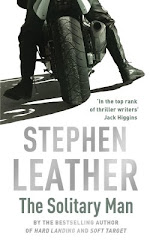It’s a funny old job, being a writer. I can’t think of any other profession where complete strangers will write in asking for help and advice and expect to get it for nothing.
The internet is to blame of course – the fact that we have websites and Facebook pages means that getting in touch is now a simple matter of knocking out an email, it’s easy to do and doesn’t cost anything.
In the old days of snail mail, contacting an author meant writing a letter, getting a stamp and posting it, and I guess most people couldn’t be bothered. Now, like most authors, I get emails every day.
It’s great to get emails telling me how much pleasure my books have given, or asking when the new one is out (though that info, like the answers to most questions I get, is on my website).
But what I find strange is the fact that so many complete strangers write in asking for advice, or even worse asking me to read their work.
Say your golf swing isn’t great, do you email Tiger Woods and ask him what you should do? Your chicken soup doesn’t taste as good as it should, do you send some to Gordon Ramsay and ask him if it needs more salt? You didn’t understand the plot of Avatar – do you email James Cameron for an explanation? Of course not. And if you’re feeling unwell, do you email a doctor you’ve never met for advice? No, you visit your GP.
So why do wannabe writers expect professional writers to offer free advice and help? It’s a complete mystery to me. Don’t get me wrong, I’m happy to offer advice but I do that on my website where there are pages and pages of advice on writing and getting published. Yet it doesn't seem to be enough for some people.
A few years back I got an email from a woman who wanted me to read her novel and give her notes on it. I said sure, but it would take me a week and my fee would be £2,000. She wrote back saying she was a single mother (sadly it wasn’t JK Rowling!) and couldn’t afford it. Why one earth would she expect me to work for free? Do you think if I’d asked her to come and clean my house for free she would have done?
I guess people don’t appreciate how hard it is to be a writer and how much work is involved. As we speak I am trying to write one book (Bangkok Bob and The Missing Mormon), waiting to edit another (Midnight – the new Jack Nightingale book) and plotting a third (the new Spider Shepherd book, which I have to finish by September). Plus I have half a dozen books that I want to read. Plus I am helping my daughter revise for her SATs. So when an email from a complete stranger drops into my inbox asking for help, what am I supposed to do? Drop everything and help someone I have never met? But if I ignore the email then I’m accused of rudeness or of being unapproachable.
The worst sort of emails are from people I have never met asking me to read their work. Why would I want to do that? What possible advantage is there to me in spending seven or eight hours reading a book written by an amateur? I barely have enough time to read the books that I want to read – why would I drop everything to read the work of a complete stranger? My time is too valuable to waste on reading something which is almost certainly rubbish. I know that sounds harsh but I’m afraid it’s true. My publisher Hodder and Stoughton has stopped accepting unsolicited manuscripts because there were so few decent ones being sent in. They could read a thousand manuscripts and not find one worth publishing. So statistically there is very little chance of me being sent a book that has any merit at all.
I really don’t get why people think that writers would read their work. If they wrote a song would they send it to David Bowie and ask him for his opinion (and help)? If they painted a picture, would they send it to Damien Hirst for advice on their brushwork? Of course not. Yet I am constantly being asked to read a just-written novel. I always say no and I think every other writer would do the same. Why? For a start, life is too short and I don’t have enough time to read the books that I want to read. But the main reason refusing is because if it contained a good idea I would probably use it myself. I just would. That’s my nature. So I would then be accused of plagiarism and rather than risk that it’s just better not to read anyone’s unpublished work. And I do say that clearly on my website!
I understand that people starting their writing careers need advice. But I don’t understand why they think that other writers should offer help and advice for free. Is there any other profession where people work for no payment? I am in the process of having covers designed for some of my unpublished books – do I expect to get that for free? No, I pay. And when I have work done on my websites, I pay. I also pay my plumber, my builder and my decorator. No one does anything for me for free. So why do complete strangers ask me for advice and expect me to do it for free? Do they think that my time and experience has no value?
So what sparked this train of thought? The following email just arrived -
Hi Stephen,
How are you doing? I wrote to you once before, late last year I think. I was really glad that you wrote back to be honest. It gave me a bit of a push to get my novel done. It's still a long way off but I finally have a plot I'm happy with and characters that I want to develop further. So, thanks for that! I went through a bit of a slump, where I temporarily lost all interest but I'm over it now.
The main reason I decided to get in touch again was that I needed a little more advice. How do you go about linking multiple plots. In your Dan Shepherd books, especially Soft Target and Dead Men (which I read last week and loved, halfway through Live Fire at the moment), you seem to have a good knack for juggling several plots. Can you offer any tips or advice on how you do it? My novel has two main plots and I'm having trouble linking them effectively.
Any tips you can offer would be greatly appreciated. By the way, are you okay with me getting in touch again if I need any more advice?
Have a great Easter and I can't wait for the next Spider novel!
John.
So, how am I supposed to react? John’s question is every easy to ask but very difficult to answer. It would be like me asking a plasterer how he gets a smooth finish on his wall. The simple answer is that you do it for ten years and you get better and better. The more complex answer would be to try to teach someone to do it and I don’t know where you’d start. Or it would be like asking Lewis Hamilton how to go fast around corners. Maybe he could explain it to an amateur but to be honest the answer it that the ability comes from thousands of hours behind the wheel.
John’s email is chatty and says nice things about my work, so I feel I owe him a reply, but it’s such a hard question to answer. And where’s the benefit to me in spending the hour or so it would take to explain it if it’s only going to be read by him? So, I thought I’d reply through my blog so at least others can read it and it stays there for all time.
So how do you go about linking multiple plots? You write lots of books, John. A lot of books. I didn’t start using multiple plots really until The Vets, my fifth book. And even then it was really one main plot with several sub plots. You have to be able to work with one plot before you can start playing with several. You have to walk before you can run. If you’re going to paint ceilings for a living, you don’t start with the Sistine Chapel.
You don’t write multiple plots for the sake of it. You write them because they are good, strong plots and because there is some connection. You can’t take two plots and force them together. If you are doing that then you have two different books. John says he has two plots and is having trouble linking them effectively. That’s like saying you are painting a picture of a farm scene and are having trouble fitting in the tiger. If the two plots aren’t connected then they shouldn’t be in the same book.
You don’t start with two separate plots and try to link them. You start with the ending where the two plots collide and you work backwards from there. You have to know where you are going before you start.
As to how you write different plot threads, I always follow one thread until it gets boring, then switch to another plot in the middle of something exciting, then leave that when it gets boring. Hopefully that means that the reader is constantly driven forward by the story.
Okay, that’s enough free advice - I have work to do. This posting is more than 1,600 words which would have been four pages of my novel. See how much time this has cost me?
Subscribe to:
Post Comments (Atom)






































2 comments:
Good article. Can see your point of view. In my line every man and his dog expects you to fix their PC for free. Wonder if my dentist will do a scale and polish in return for cleaning a virus?
Hmm, perhaps we could revert back to a barter system :)
Hi Steve, I agree and you have outlined some good points here. I think the ease of the Internet has allowed certain people to take advantage of experts. They have become lazy and the cheeky buggers expect a personal service. I get the same treatment by some people, who are just too lazy to read through my website. Perhaps we should introduce a comprehensive section of 'FAQ' or Frequently Asked Questions on our websites.
Post a Comment